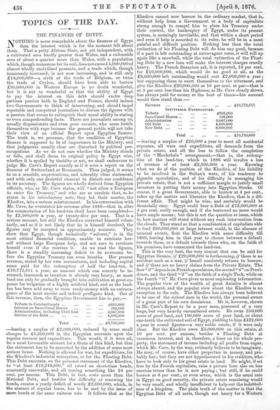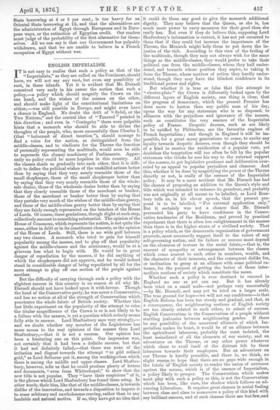TOPICS OF THE DAY.
THE FINANCES OF EGYPT.
NOTHING is more remarkable about the finances of Egypt than the interest which is for the moment felt about them. That a petty African State, not yet independent, with a cultivated area hardly greater than Wales, and a culturable area of about a quarter more than Wales, with a population which, though numerous for its soil, does not exceed 5,000,000 of almost wholly uncivilised peasants, and a trade which, though immensely increased, is not now increasing, and is still only £18,000,000—a sixth of the trade of Belgium, or twice the trade of Ceylon, should have been able to borrow £90,000,000 in Western Europe is no doubt wonderful, but it is not so wonderful as that the ability of Egypt to pay the interest on this debt should excite deep partisan passion both in England and France, should induce two Governments to think of intervening, and should impel reputable and competent journalists to discuss the figures with a passion that seems to extinguish their usual ability in stating or even comprehending facts. There are journalists among us, usually dispassionate and even poco curante, who seem beside themselves with rage because the general public will not take their view of an official Report upon Egyptian finance. The truth is, we presume, that the condition of Egyptian finance is supposed to be of importance to the Ministry, and that judgments usually clear are disturbed by political pre- occupations: As we do not care whether the Ministry stands or falls, and shall deem its original policy in Egypt wise, whether it is spoiled by timidity or not, we shall endeavour to judge Mr. Cave's Report exactly as if it were a report on the finances of Switzerland or Roumania. Thus judged, it seems to us a sensible, unpretentious, and tolerably clear statement, and with only one doubtful element to disturb our confidence in its accuracy. The figures are wholly derived from Egyptian officials, who, as Mr. Cave states, will "not allow a European to enter the Treasury," and who are so careless that, as he states in his introductory note, they led their master, the Khedive, into a serious misstatement. In his conversation with Mr. Cave, he overstated his revenue after 1886—that is, after the commutation of his land-tax shall have been completed— by £2,500,000 a year, or twenty-five per cent. That is a serious amount, but still the Khedive corrected himself volun- tarily, and as it is not likely that he is himself deceived, the figures may be excepted as approximately accurate. They show that Egypt, though technically "solvent," is in the most critical financial condition, unable to extricate her- self without large European help, and not sure to extricate herself even if she receives it. As we read the figures, there is a steadily increasing deficit to be overcome be- fore the Egyptian Treasury can even breathe. Her present revenue, stated by her own accountants, and including capital sums paid for the redemption of half the land-tax, is £10,772,611 a year, an amount which can scarcely be in- creased, inasmuch as taxation is already very heavy, as more land can only be gradually brought into cultivation at great ex- pense for irrigation of a highly artificial kind, and as the land- tax has been sold away to raise ready-money with an extrava- gance of the most unwise and indeed profligate kind. Out of this revenue, then, the Egyptian Government has to pay,—
Tribute to Constantinople £685,000 Interest on Suez-Canal Shares ... 198,000 Administration, including Civil List ... ... 3,067,000 Service of the Debt ... 4,800,000 Total .£8,750,000
—leaving a surplus of £2,000,000, reduced by some small charges to £1,800,000 in the Egyptian accounts upon the regular revenue and expenditure. This would, if it were all, be a most favourable account for a State of this kind, but that the statement has to be corrected by the addition of some most serious items. Nothing is allowed for war, for expeditions, for the Khedive's industrial enterprises, or for the Floating Debt. This Debt amounts, on the personal statement of the Khedive, to "at least £18,240,000," all raised on short-time bonds, constantly renewable, and all costing something like 24 per cent, per annum. This Debt, in fact, costs more than the National Debt, and besides the difficulty of renewing the bonds, creates a yearly deficit of nearly £2,600,000, which, in the absence of regular loans, has to be met by the issue of more bonds at the same ruinous rate. It follows that as the
Khedive cannot now borrow in the ordinary market, that la, without help from a Government or a body of capitalists. strong enough to compel him to place his Treasury under their control, the bankruptcy of Egypt, under its present system, is seemingly inevitable, and that within a short period' and even if help is accorded to its ruler, he will be in a most painful and difficult position. Nothing less than the total extinction of his Floating Debt will do him any good, because if a part is left outstanding at extravagant rates, it will roll up. again like a snowball, while the total extinction of the Float- ing Debt by a new loan will make the interest charges cruelly heavy. The French financiers ask, it is reported, 10 per cent. for £10,000,000, which would do no good at all, as the £8,000,000 left outstanding would cost £2,000,000 a year ; but supposing them to exert themselves to the uttermost, and give the Khedive £20,000,000 at 10 per cent. at par—that is at 3 per cent. less than his Highness, as Mr. Cave clearly shows,. has always paid for money at the best of times—his account would then stand thus :-
Revenue
£10,772,611
INEVITABLE Earzwnirtraz.
Tribute ... ...
£685,000,
Suez-Canal Shares ... 198,000
Administration ... 3,067,000
Old Debt *"
New Debt ... 4,800,000 2,000,000
Total ...
£10;750,000
—leaving a surplus of £20,000 a year to meet all accidental expenses, all wars and expeditions, all demands from the private estate, and all the loss to follow the completion of the " Moukabala " arrangement,—that is, the redemp- tion of the land-tax, which in 1886 will involve a loss of revenue of at least £2,500,000. a year. Knowing what we do of the position of the Khedive, of his liability to be involved in the Sultan's wars, of his tendency to gigantic speculation, and of his difficulty in managing his private estate, that is not a sufficient margin to justify small investors in putting their money into Egyptian Stocks. Of course, if a great Government, able to borrow at 4 per cent,. takes up the matter and liberates the Khedive that is a dif- ferent affair. That might be wise, and certainly would be- financially easy. Egypt could bear a Debt of £72,000,000 at 4 per cent, easily enough, and if she borrowed no more would have ample means; but this is not the question at issue, which is, how matters will stand without any such intervention from the clouds. They stand so that a combination of capitalists able to lend £20,000,000 at large interest could, in the absence o£ unusual events, float the Khedive with some difficulty till 1886, leaving him in that year to choose between a default towards them, or a default towards those who, on the faith ot his promises, have commuted the land-tax.
This is the very best, the very utmost that can be said for Egyptian finance, if £20,000,000 is forthcoming, if there is no accident such as a war, if Ismail resolutely refuses to borrow, and if there are no heavy claims from the Private Estate. The first " if" depends on French speculators, the second" if" on Provi- dence, and the third " if " on the faith of a single Turk, while on the fourth "if" Mr. Cave gives us most unpleasing information.. The popular view of the wealth of great Asiatics is almost always absurd, and the popular view about the Khedive is no exception to the rule. The Khedive has always been believe& to be one of the richest men in the world, the personal owner of a great part of his own dominions. He is, however, shown. in Mr. cave's Report to be a poor man, possessed of a very large, but very heavily encumbered estate. He owns 350,000 acres of good land, and 100,000 acres of poor land, or about one-tenth the cultivated soil of Egypt, yielding to him £422,000 a year in round figures—a very noble estate, if it were only clear. But the Khedive owes £5,000,000 on this estate, at 10 per cent. per annum, besides a Floating Debt at enormous interest, and is, therefore, a loser on his whole pro- perty, the statement of income including all profits from sugar, which Mr. Cave, by the way, evidently believes to be imaginary.. He may, of course, have other properties in money, and pro- bably has ; but they are not hypothecated to his creditors, who - have to look only to his great estate in land. He might, if set free by the French capitalists, raise a private loan also on less onerous terms than he is now paying ; but still, if he could borrow at 8 per cent., or even seven, which is the usual rate in Egypt on good security, the private estate remaining would be very small, and wholly insufficient to help out the indebted- ness of a kingdom. The plain truth of the matter is that the Egyptian Debt of all sorts, though not heavy for a Western



































 Previous page
Previous page